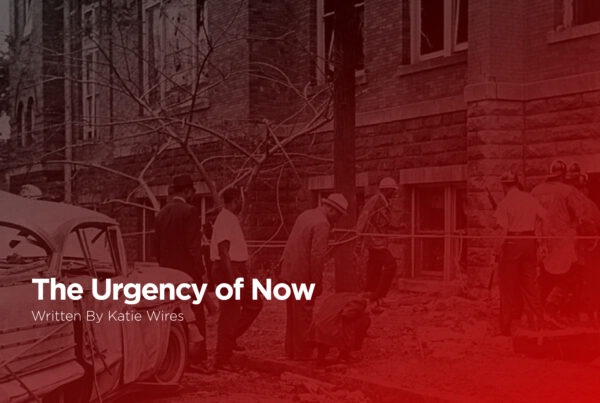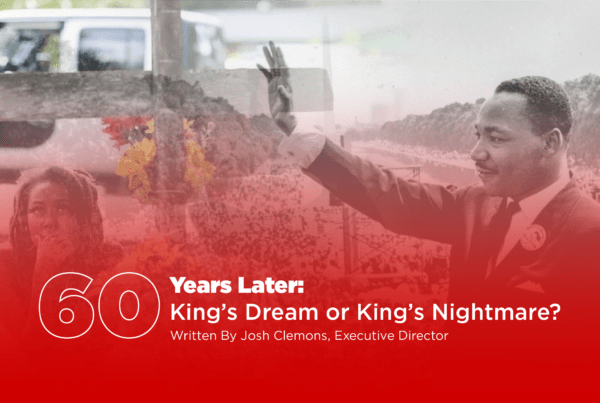My heart was heavy – not with anxiety, but sobriety. I packed my car the night before and laid half-awake wondering what God might do. In just a few hours, two friends and I would sit with the executive leadership team of an incredible Church to wrestle through the treasures of reconciliation and the tragedies of racial division in our midst.
At 5:30 am, I gave up on the idea of sleep, got on my knees, and asked the Holy Spirit for a fresh understanding of His perspective on reconciliation.
This is what happened.
With a been-there, read-that pace, I read Psalm 133. Behold, how good and pleasant it is when brothers meet together in unity… for there the Lord has commanded His blessing, life forevermore.
I felt the Lord nudge me to reread it aloud, slowly.
Behold, how good and pleasant it is when brothers dwell together in unity… for there the Lord has commanded His blessing, life forevermore.
Despite reading and reciting this passage many times, I never gave proper attention to what God actually said. He didn’t say, “it is good and pleasant when brothers meet together in unity.” He said, “dwell together in unity”.
Dwelling together and meeting together are NOT the same. The act of dwelling has elements of connection, vulnerability, longevity, and commitment that the act of meeting does not. Meetings have their purpose; however, the Body of Christ is more than a group of individuals who meet. Our dwelling place is the Kingdom and we are one big family – literally.
So, if God’s perfect will is that we (brothers in Christ), would dwell together in unity, why do we settle for meeting together instead? Because dwelling together feels like unnecessary work when we live in ignorance of its benefits. Communities that dwell together in pursuit of Kingdom reconciliation:
- Enjoy deeper, more mature perspective of God’s nature and more tools to accomplish His work. God has placed a part of Himself in every people-group. When we pursue connection with people from different backgrounds, we are pursuing connection with the varying aspects of Our Creator. Through connection, we don’t just see God more clearly, we are also more equipped for the tasks and challenges He calls us to navigate. Together, with all the saints (from every socio-economic status, from every people-group, from every gender, from every generation) we know and show the breadth of the love and power of God to our dying world.
- A world that watches in awe. The world marvels at true unity – people distinctly different but full of love, willfully leaning in, practicing mercy, standing against selfishness, and fighting for one another. Jesus requested to His Father that His followers “may become perfectly one, so that the world may know that you sent me and loved them even as you love me.” The world is looking for family. The family that Jesus prays for in John 17, is connected and compassionate, full of God’s love. When we exempt ourselves from the intentional work of reconciliation, we choose to perpetuate a dismissive and detached Christianity that stands in stark contrasts to Jesus’ example. And, let’s be real, no one wants to join a dismissive, willfully detached family. It’s unattractive.
With such great benefits, you wonder why so few Christian communities live in pursuit of Kingdom reconciliation. I think the painful reality of divorce among Christians and the painful reality of cross-cultural division within the Body of Christ have some of the same root issues. We struggle to practice the basic block-and-tackles of the Gospel.
If I’m going to live in close relationship with ANYONE other than myself it will be because I intentionally pursue them, seek to understand, admit and acknowledge my failure, repent, forgive them in their failures, fight for their good, trust God for my own good, communicate when I’m hurt, give them space to communicate when they’re hurt, take my thoughts captive, intercede, do it when it doesn’t necessarily feel good, prioritize obeying God’s voice, enter into their suffering with them, enter into their celebration with them, hate their sin, love the glory that God has hidden in them, and consider their interest above my own. I’ll practice these blocks and tackles over and over and over again. That’s the only way marriages work, and it’s also the only way reconciliation works. It’s the only way brothers dwell together in unity. Apart from these tools, we can at best meet together for moments of warm feelings or at worst war against each other.
Our commitment to dwelling together will force us into a dependence on the Cross, the Word of God, and the power of His Holy Spirit in a profound way. It means we don’t ever get to stop growing, being humbled, saying we’re sorry, and learning. Dwelling together in unity will require that we grow comfortable being uncomfortable. (That in itself is a blessing in disguise because it’s really hard to bring and enjoy the Kingdom of God if we’re living as slaves to our own comfort. One might say it’s impossible – like serving two masters.)
So, how do we measure whether or not we’re actually connected and dwelling together?
In 1 Cor 12:25-26, Paul describes Kingdom connection saying, “that there may be no division in the body, but that the members may have the same care for one another. If one member suffers, all suffer. If one member is honored, all rejoice together.” If our love for unity isn’t bearing the fruit of an increasing experience with the sufferings and triumphs of the “others”, then we are likely settling for a worldly standard of unity. If I am numb to the pains and joys that a part of my own body is facing, I have a connection issue and need a doctor.
Praise Jesus! He came for the sick, and we don’t have to remain in our state of apathy, willful ignorance, and division. We can repent and align ourselves with His example, and choose the path that is full of His blessing – life forevermore.





